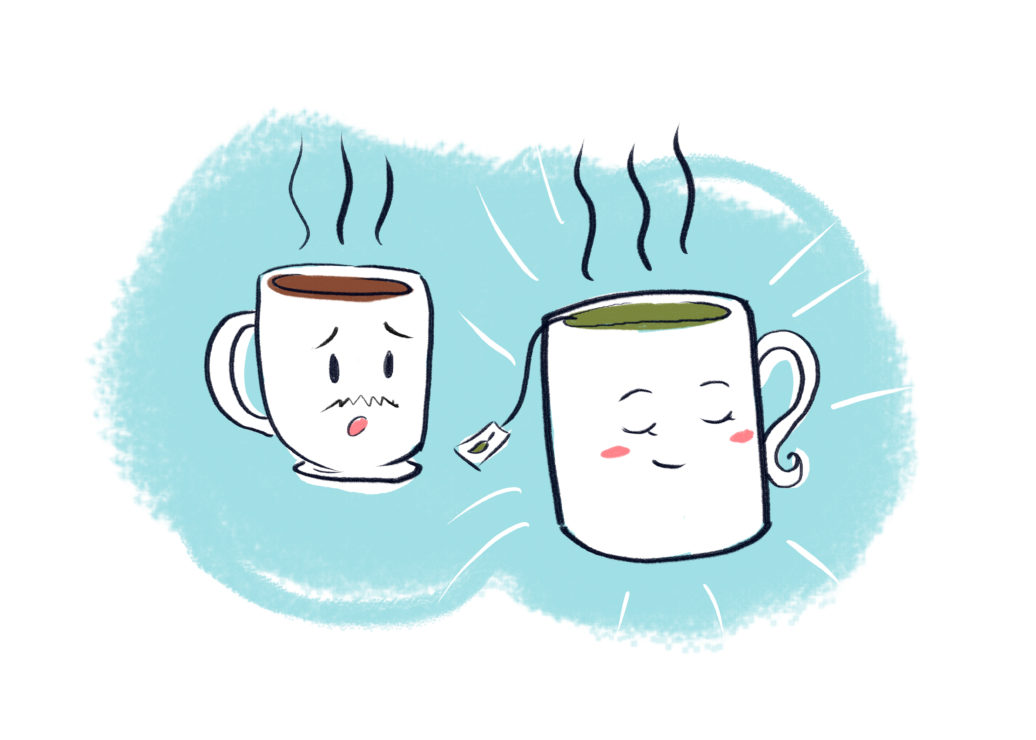The case for quitting caffeine

Six months ago, I quit coffee in an effort to ease my anxiety. Somehow, I’m still functioning as a recovering caffeine addict and a low-key workaholic.
Last year, when I was taking four classes and working part-time, I became absolutely dependent on that warm cup of joe. I woke up in the morning, stumbled out of bed and over to the coffee cupboard to make myself a dark, black pour-over cup. On a typical day, I would have between two and six coffees.
My never-ending and stress-inducing to-do list led me to constantly guzzle caffeine, with the hope of somehow being more productive. But really, caffeine did not make me any more successful, productive, or even awake — it just made me into an anxious yet alert squirrel for a few hours. Quitting six months ago made me realize how caffeine was causing me anxiety, and actually made me more productive.
When you drink coffee, you get a hit of dopamine. Aside from feeling anxious and perpetually tired, people that drink too much coffee report feeling like their heart is exploding. So much so, in fact, that the American Association of Poison Control Centers said they actually receive over 3 000 calls a year from people with this concern.
Although I have been a fervent caffeine drinker since I was 16, my caffeine intake spiked when I worked at Starbucks last year. On days where I started work at 5:30 a.m., I was up at 4:30 a.m. to make myself a coffee before my shift. During my break, I would get a Tall Chai Tea Latte with one shot of espresso — also known as a Dirty Chai.
By this point, I would have about 275 mg of caffeine in my body, and it wasn’t even 8 a.m.
I was nowhere near overdosing on caffeine. That would take between 50-100 eight oz cups of coffee. But the anxiety I was feeling around exam time was definitely compounded by my constant need for caffeine — making me feel a tightness in my chest so strong that I was taking pain medication and struggling to breathe.
Despite drinking coffee daily, I still felt exhausted. I was falling asleep in classes and I couldn’t do things I loved — like running along Dallas Road or going out with friends — because I had no energy by 3 p.m. every day. Coffee would give me a quick kick of energy, but I would end up napping as soon as it wore off.
I quit drinking coffee and swapped it for decaffeinated green tea and water. It was a much healthier move, and the tightness in my chest went away.
For a week or so, I had full-on withdrawal symptoms: I was headachy, rude, and, of course, tired.
While most of those symptoms went away, my tiredness continued and was starting to seriously impact my quality of life and my relationships. My doctor told me my thyroid — the thing in your body that regulates your metabolism, basically — was not up to speed. I’m fine now, but for months I was trying to cure myself with caffeine and dismissing what was ultimately a medical issue.
After going through months of health issues and quitting caffeine, I had to get real with myself about my priorities and how unrealistic my to-do lists often were. I’m still struggling to figure that out, but my marks have without a doubt improved by following the old adage “work smarter, not harder.”
To be clear, I’m not advocating for students to ditch coffee completely. I love the stuff.
But I do think we need to get real about how much we rely on caffeine for productivity. In a university where 70 per cent of students feel overwhelmed, too many of us pretend to be totally fine with a stressful workload by piling on the caffeine — a drug proven to lead to increased anxiety.
An average student’s workload amounts to more than a full-time job. It’s no wonder students feel overwhelmed, and feel like they need caffeine to get through the day. But caffeine isn’t a need — it’s a temporary fix for tired minds, and it leads to increased feelings of stress.
Like university, coffee is expensive and makes you anxious. If you pull all-nighters fueled by Yerba Mates and espresso shots, you’re adding on to your stress with every sip. So in 2020, resolve to kick coffee to the curb. You’ll thank me for it, after the withdrawal symptoms wear off.







